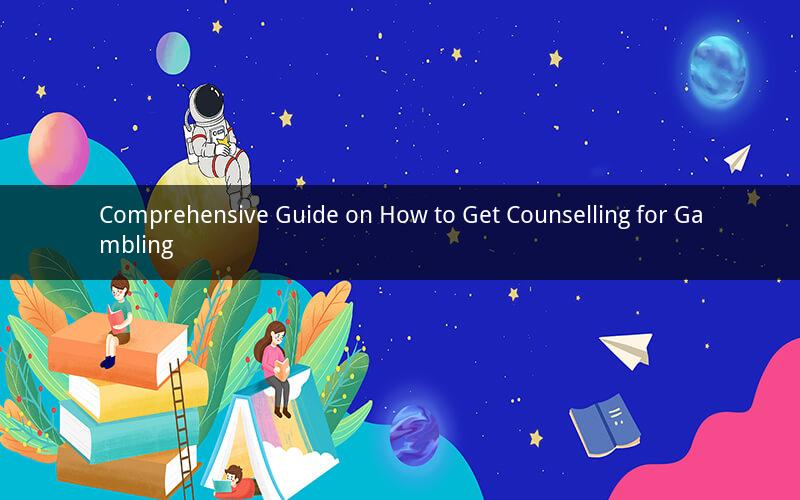
Introduction:
Gambling addiction is a serious issue that affects millions of people worldwide. It can lead to financial, emotional, and social problems. If you or someone you know is struggling with gambling addiction, seeking professional counselling is a crucial step towards recovery. This article provides a comprehensive guide on how to get counselling for gambling, including the types of counselling available, the process of finding a suitable therapist, and tips for a successful therapy experience.
1. Understanding the Importance of Counselling for Gambling Addiction
Gambling addiction is a complex disorder that requires specialized treatment. Professional counselling can help individuals understand the underlying causes of their addiction, develop coping strategies, and regain control over their lives. Here are some key reasons why counselling is essential for gambling addiction:
a. Addressing the root causes: Counselling helps individuals identify the factors that contribute to their gambling addiction, such as financial stress, boredom, or social anxiety.
b. Learning healthy coping mechanisms: Therapy can teach individuals effective ways to manage stress, anxiety, and other triggers without turning to gambling.
c. Building a support system: Counselling provides a safe and supportive environment where individuals can share their experiences and receive guidance from professionals and peers.
2. Types of Counselling for Gambling Addiction
There are various types of counselling available for gambling addiction, each with its unique approach. Here are some common types:
a. Individual therapy: This involves one-on-one sessions with a therapist, where individuals can discuss their thoughts, feelings, and experiences in a confidential setting.
b. Group therapy: Group therapy allows individuals to connect with others who are facing similar challenges. It provides an opportunity to share experiences, learn from others, and develop a sense of community.
c. Family therapy: Family therapy involves the participation of family members to address the impact of gambling addiction on the entire family unit.
d. Cognitive-behavioral therapy (CBT): CBT focuses on identifying and changing negative thought patterns and behaviors that contribute to gambling addiction.
e. Dialectical behavior therapy (DBT): DBT helps individuals develop skills to manage emotions, improve relationships, and cope with stress.
3. Finding a Suitable Therapist
Choosing the right therapist is crucial for a successful therapy experience. Here are some tips for finding a suitable therapist for gambling addiction:
a. Seek referrals: Ask friends, family, or support groups for recommendations of therapists who specialize in gambling addiction.
b. Check credentials: Ensure that the therapist has the necessary qualifications, such as a license or certification in addiction counseling.
c. Consider the therapy approach: Choose a therapist who uses a therapy approach that aligns with your preferences and needs.
d. Evaluate the therapist's experience: Look for a therapist who has experience working with gambling addiction and understands the unique challenges associated with it.
4. Preparing for Therapy
To make the most of your therapy experience, it's essential to prepare adequately. Here are some tips for preparing for therapy:
a. Set clear goals: Identify what you want to achieve through therapy and communicate these goals to your therapist.
b. Be honest and open: Therapy requires honesty and openness. Share your thoughts, feelings, and experiences without fear of judgment.
c. Be consistent: Attend therapy sessions regularly and follow your therapist's recommendations outside of sessions.
d. Seek support: Consider joining a support group or seeking additional resources to complement your therapy experience.
5. Tips for a Successful Therapy Experience
a. Be patient: Recovery from gambling addiction is a gradual process. Be patient with yourself and understand that setbacks are a normal part of the journey.
b. Maintain open communication: Keep the lines of communication open with your therapist and share any concerns or progress you make.
c. Stay committed: Stay committed to the therapy process and continue working on your goals even after you feel you have made significant progress.
d. Practice self-care: Take care of your physical, emotional, and mental well-being by engaging in activities that promote relaxation and stress relief.
Conclusion:
Seeking counselling for gambling addiction is a crucial step towards recovery. By understanding the importance of counselling, exploring the different types of therapy available, finding a suitable therapist, and preparing for therapy, individuals can increase their chances of overcoming their addiction. Remember, recovery is a journey, and with the right support and commitment, it is possible to regain control over your life and move forward.
Questions and Answers:
1. Q: What is the first step in seeking counselling for gambling addiction?
A: The first step is to acknowledge that you have a problem and are ready to seek help.
2. Q: How long does therapy for gambling addiction typically last?
A: The duration of therapy varies depending on the individual's needs and progress. Some individuals may require short-term therapy, while others may benefit from long-term treatment.
3. Q: Can therapy help someone overcome a gambling addiction on their own?
A: While therapy can be effective, it is often more beneficial when combined with other support systems, such as support groups or family therapy.
4. Q: What if I am unable to afford therapy for gambling addiction?
A: There are various resources available to help individuals access affordable or free therapy, including government-funded programs, non-profit organizations, and sliding scale fees.
5. Q: Can therapy help prevent a relapse into gambling addiction?
A: Yes, therapy can help individuals develop skills and strategies to prevent relapse. It is important to continue working on these skills even after therapy ends.